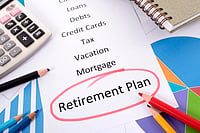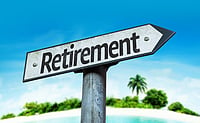The dialogue from Stanley Kubrick’s unforgettable film - Eyes Wide Shut, “I have seen one or two things in my life but never, never anything like this", reminds me of the unfortunate retiree who stumbles into his current state of affairs – read: no active income – with little preparation and plenty of trepidation. It is a shocker for him, of course, given the full impact of the relentless inflation he is about to face, and the utterly mortifying feeling that his life could get upended if his investment strategies somehow go wrong.
Well, this column could have been a sob-story, a sorry excuse for an individual who did not do the recommended things, who failed to start early and invest methodically. But we will not get to that old chestnut just yet, instead, let us focus on that seemingly utopian concept – retirement at forty-five. Yes, my friend, that is actually not impossible to achieve in today’s world if you get your financial house in order. And you can well reach that milestone by doing one or more of the things I will briefly allude to in the following paragraphs.
I will, mind you, not advise you to look for an alternative career or to start a brand new business. That is because you can work all that out for yourself if you want to. However, I will really recommend an alteration in your asset mix in keeping with the change in circumstances. Assuming you have built your pile and have indeed retired at 45, you need to create a fresh income stream by tapping your investments.
And that, dear retiree, means some added dependence on debt, especially fixed-income securities if you do not bear greater risk. You can do this in a number of ways, a few of which can be discussed briefly within the purview of this column. Let us start with the simplest -- investment in fixed deposits (with quarterly interest option, maybe). That will enable you to receive regular income, which you will perhaps need to run your household in a fitting manner. Now, if you are indeed reading this and listening to sane advice, may I suggest the inclusion of several kinds of FDs in your portfolio? I am referring to a calibrated diversification of sorts. Here’s how:
Buy FDs of different tenures, these will mature at various times and will give you a sense of liquidity at different junctures. You can plan your FD outlay in line with your own investment goals.
Broadbase your deposits by choosing several banks, corporates and NBFCs. Of course, you must consider their creditworthiness, a close look at their latest credit ratings will be important in this context.
Remember your risks at all times. You are not really insured against defaulting companies that may have sold you their deposits. So do not invest too much in this form of asset. Instead, leave sufficient room for other categories of debt.
As for these “other categories”, I wish to specifically refer to well-managed debt funds. The latter, as you well know, will give you market-determined returns. So the services of good fund managers will be particularly useful here. As for specific funds, do make sure you are selecting the very best – these should as always, be in line with your investment horizon. Keeping a few debt funds for meeting long-term goals is absolutely critical. You will, after all, live long after you have superannuated at forty five.
That, my friend, brings me to the jumbo-sized question: what will you do with all the time you will have? If you retire early, and do not really know what to do with your time, well, I must say you are travelling down quickly towards a destination called disaster. Therefore, please parcel out your time, spread it thinly between activities (yes, those post-retirement years can be tedious too), and perhaps pursue a pleasant hobby or two.
I personally do not put a very huge premium on people. You know, there are all sorts of sentiments that can come into play. “Hello, I will make new friends when I stop going to the office”, may be one of those things that are never conclusively proved. No, I do not think that actually works for everybody. We will discuss such fine issues later.
Nevertheless, coming back to our central topic, I will urge you to assess your risk-taking capacity once again. At 45, if you have retired, you need to ascertain exactly how much your margin of tolerance has changed. Most people live their life as prisoners of their circumstances. An individual who chooses to do otherwise and buck the trend deserves all our wishes. To use some of Stanley Kubrick’s words (we started with him, and so let us end with him too), life itself has no meaning, we only lend some meaning to it by choosing to do what we can do with it.
Here’s saying three cheers to retirement!
The author is a Director, Wishlist Capital Advisors
DISCLAIMER: The views expressed are the author own, and Outlook Money does not necessarily subscribe to them. Outlook Money shall not be responsible for any damage caused to any person/organisation directly or indirectly.






























